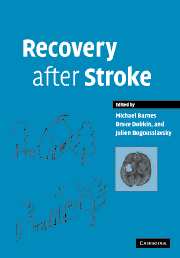Book contents
- Frontmatter
- Contents
- List of authors
- Preface
- 1 Stroke: background, epidemiology, etiology and avoiding recurrence
- 2 Principles of recovery after stroke
- 3 Regenerative ability in the central nervous system
- 4 Cerebral reorganization after sensorimotor stroke
- 5 Some personal lessons from imaging brain in recovery from stroke
- 6 Measurement in stroke: activity and quality of life
- 7 The impact of rehabilitation on stroke outcomes: what is the evidence?
- 8 Is early neurorehabilitation useful?
- 9 Community rehabilitation after stroke: is there no place like home?
- 10 Physical therapy
- 11 Abnormal movements after stroke
- 12 Spasticity and pain after stroke
- 13 Balance disorders and vertigo after stroke: assessment and rehabilitation
- 14 Management of dysphagia after stroke
- 15 Continence and stroke
- 16 Sex and relationships following stroke
- 17 Rehabilitation of visual disorders after stroke
- 18 Aphasia and dysarthria after stroke
- 19 Cognitive recovery after stroke
- 20 Stroke-related dementia
- 21 Depression and fatigue after stroke
- 22 Sleep disorders after stroke
- 23 Technology for recovery after stroke
- 24 Vocational rehabilitation
- 25 A patient's perspective
- Index
25 - A patient's perspective
Published online by Cambridge University Press: 05 August 2016
- Frontmatter
- Contents
- List of authors
- Preface
- 1 Stroke: background, epidemiology, etiology and avoiding recurrence
- 2 Principles of recovery after stroke
- 3 Regenerative ability in the central nervous system
- 4 Cerebral reorganization after sensorimotor stroke
- 5 Some personal lessons from imaging brain in recovery from stroke
- 6 Measurement in stroke: activity and quality of life
- 7 The impact of rehabilitation on stroke outcomes: what is the evidence?
- 8 Is early neurorehabilitation useful?
- 9 Community rehabilitation after stroke: is there no place like home?
- 10 Physical therapy
- 11 Abnormal movements after stroke
- 12 Spasticity and pain after stroke
- 13 Balance disorders and vertigo after stroke: assessment and rehabilitation
- 14 Management of dysphagia after stroke
- 15 Continence and stroke
- 16 Sex and relationships following stroke
- 17 Rehabilitation of visual disorders after stroke
- 18 Aphasia and dysarthria after stroke
- 19 Cognitive recovery after stroke
- 20 Stroke-related dementia
- 21 Depression and fatigue after stroke
- 22 Sleep disorders after stroke
- 23 Technology for recovery after stroke
- 24 Vocational rehabilitation
- 25 A patient's perspective
- Index
Summary
Introduction
Stroke is commonly seen as an affliction of old age, but it happens to younger people as well. It frequently strikes people in the prime of life, often for no known reason. Not only is it a big killer, along with heart disease, cancer, and respiratory illness, but also it is the largest single cause of severe disability. It happened to me in my early forties and completely changed my life.
Personal story
In June 1993, I was the defending barrister in a burglary case in North London. I was cross-examining a police sergeant about the vigorous arrest he had made of my “entirely innocent client.” He'd seen my “entirely innocent client” backing out of someone else's bathroom window and had jumped to the wrong conclusion, as policemen sometimes do.Mid cross-examination I suddenly felt a slight pain in the back of my neck. I paused for a moment, wondering what was happening … and then the lights went out! I awoke a fewminutes later, horizontal, unable tomove and unable to speak. Although I had no idea what was going on, I realized that itmust be serious as a para-medic was kneeling beside me trying to reassure me that it wasn't. I was stretchered into an ambulance and taken off to the nearest hospital, an old Victorian workhouse of a place that should have been pulled down years ago. I was borne into casualty still wearing full battle dress – my barrister's outfit, the wig and gown etc. – but I was totally incoherent. My words were slurred and were just not coming out right. I was thus unable to explain the eccentricities of court dress and the hospital staff just assumed that I was a drunken actor. Or maybe a brief on a bender. In any event, I was left in a corner to sleep it off. Soon I felt that slight pain in the back of my neck again and I was suddenly unable to breathe. My limbs were seizing up. The medics gave me some oxygen, which eased my situation, but they took it away after a short while. I passed out again and this time was gone for days.
- Type
- Chapter
- Information
- Recovery after Stroke , pp. 637 - 645Publisher: Cambridge University PressPrint publication year: 2005
- 1
- Cited by



